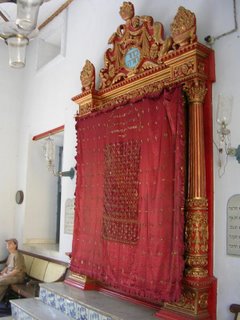
This picture contains the inner side image of the oldest Indian Synagouge at Cochin
India has, historically, been a refuge and sheltered people of all religions, creeds and beliefs – Zoroastrians, Jews, Sufis, and more recently Bahais - all were granted protection and security when they sought it. They were accepted into the fold of the mainstream society, given land and equal opportunity to excel in their profession of choice – and remain Indians. Hinduism, Jainism, Buddhism, Sikhism are religions of the land – all were born in India. The central Asian invaders brought Islam. The colonial powers brought Christianity. India remained a large-hearted host to all, enriched its cultural heritage – and became a truly secular nation. People from all communities rose to become eminent citizens of the land.
The earliest Jews came to India two thousand years ago. They were escaping persecution in Galilee. Some came after the destruction of the Second Temple in 70CE. The Sephardic Jews came to India from western European nations such as Holland and Spain. The 16th and 17th century migrations created important settlements of Jews from Persia, Afghanistan, and Khorasan (Central Asia) in northern India and Kashmir. In the 17th and 18th centuries, Jewish settlers came from the Middle East and North Africa. Jews settled in different areas – from Kashmir in the north, to Cochin in the south, Calcutta in the east and Bombay (renamed Mumbai) in the west. By the late 18th century, Bombay became the largest Jewish community in India. Today only a few thousand remain in India - most having migrated to Israel, England, USA, and Australia. They have left behind them a rich legacy of synagogues, public institutions, and nostalgia. Only two synagogues remain open in Calcutta (Kolkata) for its 60 odd Jewish population. The Pardesi synagogue in Cochin was built in1568 and was also partially destroyed by the Portuguese in 1661. Kerala is the oldest among the surviving synagogues in the country. It is a National Heritage.T he largest concentration of Jews in India still remains in Bombay (particularly in Thane, a suburb of Bombay) - but they are only about 4000 in number - a mere fraction of the vitality they once generated in the city.
The five main Jewish communities of India are: Bene Israel, Cochini, Baghdadi , Ashkenazi and Bene Menashe. The first three communities had some social religious connections with each other but most of the social religious connections of each community were within their own community and they regarded the other as ‘outsiders’. The Bene Israel claim to be descended from Jews who escaped persecution in Galilee in the 2nd century BCE. The Bene Israel resemble the non-Jewish Maratha people in appearance and customs, which indicates intermarriage between Jews and Indians. However, the Bene Israel maintained the practices of Jewish dietary laws, circumcision, and observation of Sabbath as a day of rest.
The Jews of Cochin say that they came to Cranganore (south-west coast of India) after the destruction of the Temple in 70ce. They had, in effect, their own principality for many centuries until a chieftainship dispute broke out between two brothers in the 15th century. The dispute led neighbouring princes to dispossess them. In 1524, the Moors, backed by the ruler of Calicut (today called Kozhikode) attacked the Jews of Cranganore on the pretext that they were "tampering" with the pepper trade. Most Jews fled to Cochin and went under the protection of the Hindu Raja there. He granted them a site for their own town which later acquired the name "Jew Town" (by which it is still known).
Near the end of the 18th century, a third group of Indian Jews appears. They are the middle-eastern Jews who came to India through trade. They established a trading network stretching from Aleppo to Baghdad to Basra to Surat/Bombay to Calcutta to Rangoon to Singapore to Hong Kong and eventually as fare as Kobe in Japan. There were strong family bonds amongst the traders in all these places.
Jews always played a great role in the art, literature and politics. Some of the eminent jews are: Nissim Ezeickel (poet) Abu Abraham (cartoonist),the film stars like Helen, David and Sulochana . Dr. Abraham Erulkar (the personal physician/friend of Mahatma Gandhi), Maj. Gen. Samson who was awarded the Padma Bhushan and Dr. Jerusha Jhirad was awarded Padma Shri by the Government of India.
2 comments:
Wonderful post. It will be interesting to know if we can find portuguese jews in the sephardite group (because "sephardite" include people from Spain and Portugal). Some of portuguese jews escape to Holland, like Spinoza.
Thank for comment
Post a Comment